Xavier Gabriel can take some credit if the tiny Catalan mountain town of Sort is one of the most famous in Spain.
He runs a lottery shop called La Bruja de Oro, or The Golden Witch, in a town whose name, aptly, means “Luck” in Catalan. Its fortune in having sold many prize-winning tickets has made it a household name and a successful online business.
But the crisis surrounding Catalonia’s push for independence has changed life for 60-year-old Gabriel. He joined more than 1,500 companies in moving their official headquarters out of the wealthy region in recent weeks. Their main fear: that they would no longer be covered by Spanish and European Union laws if Catalonia manages to break away, dragging their businesses into unknown territory.
“The time had come to make a decision,” said Gabriel, who employs 16 people and describes himself as a proud Catalan.
Hedging their bets
Like Gabriel’s, the vast majority of companies that moved their headquarters didn’t transfer workers or assets, such as bank holdings or production equipment. So far, it’s mainly a form of legal insurance. But as the political crisis escalates, the risk is that companies are deferring investments and hiring. There is evidence that tourists are holding off booking, perhaps frightened by images in the media of police crackdowns, street demonstrations and strikes.
And the situation risks getting worse before it improves: the central government’s decision Friday to take control of the region could spiral out of control if there is popular resistance, whether by citizens or local authorities like the Catalan police force.
“There is absolutely no doubt that the crisis is having a very damaging effect on the economy,” said Javier Diaz Gimenez, an economics professor at Spain’s prestigious IESE Business School.
Financial markets in Spain have so far fallen only modestly, reflecting investors’ apparent belief that the tensions will eventually be resolved. The Spanish government has called a regional election in Catalonia for Dec. 21 and could later consider revisions to the constitution that might placate some of the independence supporters.
But that could take some time, Diaz Gimenez says, given how confrontational both sides have been.
Banks leave
The list of businesses moving headquarters includes Catalonia’s top two banks, Caixabank and Sabadell, which are among Spain’s top five lenders. Then there is the Codorniu cava sparkling wine maker for which Catalonia is famous. Another well-known cava maker, Freixenet, is also planning to follow if the independence drive continues. Publishing giant Planeta, the world’s leading Spanish-language publisher and second biggest publisher in France, has also moved its official address out of Catalonia.
Caixabank says it suffered a moderate but temporary run on deposits because of the crisis, but said it has since recovered and was adamant the move was permanent.
Shares for Caixabank, Sabadell and some other companies have been volatile, falling after the Oct. 1 vote for independence and jumping sharply when they announced their decision to move headquarters.
Tip of the iceberg
Lottery shop owner Gabriel says ticket sales this month are up nearly 300 percent over last year, a rise he attributed to popular support for his decision to move his business.
Diaz Gimenez said the decisions to move headquarters, while not immediately affecting jobs, were “just the tip of the iceberg.”
“Plans to relocate firms or invest elsewhere are going to accelerate and some of it is going to go to, say, Poland, and it’s never going to come back,” he said.
“People that were thinking about investing in Spain and Barcelona are starting to think again,” he said. “It’s not just Catalonia. It’s the mismanagement by Spain, which is proving that it’s not a serious country because it cannot solve this thing.”
Spanish economy humming
The turmoil, ironically, comes just as Spain has been enjoying some of the fastest economic growth in Europe.
Its economy, the fourth-largest in the 19-country eurozone, grew by a hefty quarterly rate of 0.9 percent in the second quarter. The government has maintained its forecast for growth in 2017 at 3.1 percent, but revised its estimate for 2018 from 2.6 percent to 2.3 percent because of the political crisis. Moody’s credit rating agency has warned that a continued political impasse and, ultimately, independence for Catalonia would severely hurt the country’s credit rating.
Billions at stake
Tourism seems to be taking the biggest hit so far.
Experts say spending in the sector in Catalonia in the first two weeks of October — that is, following the independence referendum — was down 15 percent from a year earlier.
Tourism represents about 11 percent of Spain’s 1.1-trillion euro ($1.3 trillion) gross domestic product, with Catalonia and its capital, Barcelona, providing a fifth of that, being the most popular destinations for visitors.
Exceltur, a nonprofit group formed by the 25 leading Spanish tourist groups, expects growth in tourism this year to ease from an estimated 4.1 percent to 3.1 percent.
Reservations in Barcelona alone are down 20 percent compared with last year, it said. If the trend continues in the final three months of the year, it could lead to losses of up to 1.2 billion euros ($1.41 billion) in the sector, which in turn could affect jobs.
Analysts fear that the independence movement’s stated aim of continuing to create as much social and economic chaos for Spain as possible could exacerbate the situation. The Catalan National Assembly group has been openly talking about a boycott against Spain’s top companies and major strike activity.
“Spain, its tourism, everything is very dependent on image,” Diaz Gimenez said. “And this is just killing it.”







